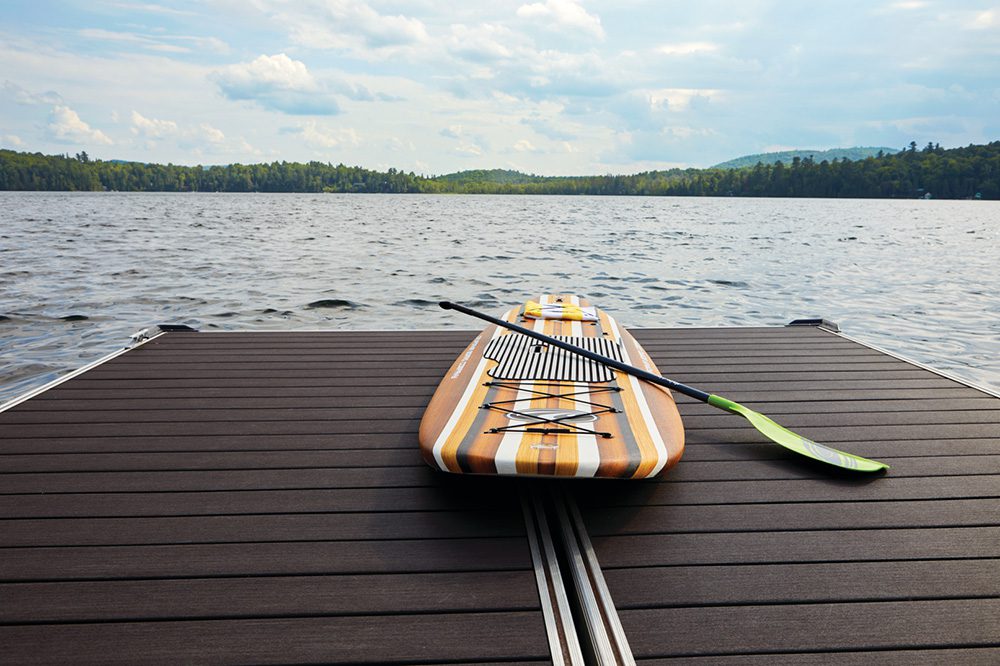When it comes to building or renovating a dock, the choice of decking material is crucial. Not only should the decking be aesthetically pleasing, but it should also be durable, resistant to the elements, and require minimal maintenance.
Composite decking has become a popular choice for docks due to its longevity and low maintenance requirements. In this article, we’ll explore four popular “composite decking” options:
Trex, HDPE, and TimberTech Advanced PVC, with a special focus on why TimberTech might be the best choice for your dock.
Important Note:
Many consumers loosely use the term composite decking to cover all plastic decking. Composite decking is made from wood fiber and a blend of plastic that is melted and extruded into a deck board.
There have been issues where the wood particles in the boards still can absorb moisture in very wet areas. This can cause performance issues like mold growth and rapid deterioration of the deck board.
For this article we’ll cover some additional plastic decking materials that can perform better for wet areas such as boat docks.
Trex Decking – Composite Decking
Pros:
- Durability: Trex decking is known for its long-lasting nature. Made from a blend of wood fibers and plastic, it’s designed to resist rot, decay, and insect damage.
- Eco-friendly: Trex uses recycled materials in its products, making it an environmentally friendly choice.
- Variety: Available in a range of colors and finishes, Trex offers versatility in design.
Cons:
- Heat Retention: Like many composite materials, Trex can get hot under direct sunlight, which might be a concern for docks in sunny areas.
- Cost: Trex is on the pricier side when compared to some other decking materials.
- Composite: Contains wood fiber mixed with plastic and it’s not capped on the bottom of the deck board.
Tan Deck – HDPE Decking
Pros:
- Resistance: HDPE (High-Density Polyethylene) decking is resistant to mold, mildew, and insects. It doesn’t absorb water, making it a good choice for docks.
- Low Maintenance: HDPE requires minimal upkeep. It doesn’t need to be stained or sealed.
- Eco-friendly: Many HDPE deck boards are made from recycled plastics, reducing environmental impact.
Cons:
- Flexibility: HDPE can be more flexible than other materials, which might not offer the firmness some people prefer for their docks.
- Appearance: Some users feel that HDPE doesn’t mimic the natural look of wood as closely as other composites.
- Static: There have been issues with static electricity and boat refueling.
TimberTech Advanced PVC Decking
Pros:
- Superior Performance: TimberTech’s Advanced PVC decking is crafted to resist scratches, stains, and mold. It’s also lightweight, making it easier to install.
- Aesthetics: TimberTech offers a range of colors and styles, closely mimicking the natural beauty of wood.
- Heat Dissipation: Unlike many other composites, TimberTech’s PVC decking is engineered to stay cooler under the sun, making it comfortable for bare feet.
- Warranty: TimberTech offers a robust warranty, showcasing their confidence in the product’s longevity and durability.
- PVC Construction: Made of high-performance and recycled polymers (and absolutely no wood fibers), TimberTech Advanced PVC decking is highly resistant to moisture damage like mold and mildew, and it won’t splinter, crack, warp, peel, or rot.
Cons:
- Cost: While TimberTech offers superior features, it might come at a higher initial cost than some other decking materials.
TimberTech Composite Decking
Pros:
- Superior Performance: TimberTech’s composite decking is made to resist scratches, stains, and mold. It’s got a composite core which is a mix of wood fiber and plastic but it’s capped on all 4 sides with a PVC shell.
- Aesthetics: TimberTech offers a range of colors and styles, closely mimicking the natural beauty of wood.
- Warranty: TimberTech offers a robust warranty, showcasing their confidence in the product’s longevity and durability.
- Cost: TimberTech composite decking is cheaper than their PVC decking.
Cons:
- Composite: The core of the board does contain a mixture of wood fiber and plastic mixed together but it’s capped on all 4 sides with PVC.
Conclusion
While Trex and HDPE decking have their merits, TimberTech Advanced PVC decking stands out as the best choice for docks. Its combination of durability, aesthetics, heat dissipation, and warranty make it a worthy investment for those looking to build a dock that will stand the test of time and provide maximum comfort and functionality. As always, consider your specific needs, budget, and location before making a final decision.
